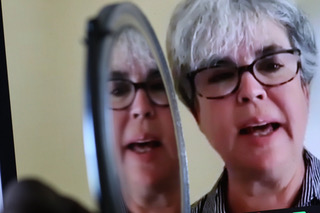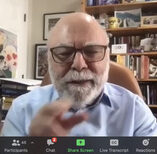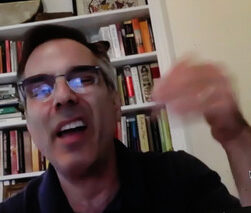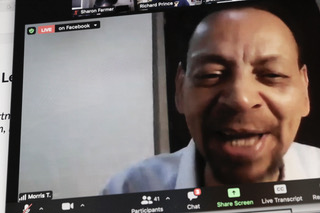Lack of Black Correspondents Has a Cost
Jean-Pierre Named White House Press Secretary
Homepage photo: Terrell Jermaine Starr, via YouTube
Journal-isms Roundtable photos by Sharon Farmer/sfphotoworks
[btnsx id=”5768″]
Lack of Black Correspondents Has a Cost
On Monday, the BBC posted a report called “Not Our War,” by Black correspondent Peter Okwoche, who went to Ukraine to witness the efforts of terrified African students to escape.
In Przemyśl (pronounced Sheh-MI-Shella), a small town on the Polish border, Okwoche interviewed one of the now-refugees. It was a part of the world where “myself and my cameraman, Ameer Ahmed, were the only Black journalists I saw.”
“Where are you from?
“He’d say ‘I’m from Ghana’
“I’d say, ‘Hi, Chale“
“‘How you buddy? How you doing? You doing well?'”
“And they would perk up. ‘This is somebody like us. This is somebody who actually knows who we are.’ “
The scene encapsulates the consensus at the April 24 Zoom meeting of the Journal-isms Roundtable, a rich and nuanced discussion on the need for diversity among foreign correspondents and how to join those ranks.
A video of the Roundtable: Sixty-one people joined the Zoom, with another 263 watching on Facebook.
As seconded by Eva Rodriguez (pictured below), until last month deputy foreign editor for The Washington Post, “so much of what we do as Western organizations is through a Western lens — by definition, which distorts what is actually happening on the ground.
“It does not always reflect the real experiences of groups in those countries, and particularly women and women of color, who are often underrepresented in the news, not quoted as experts in that, and so I do think we need to think as foreign correspondents of those stories that are not necessarily at the top of our list for our editors.”
 Rodriguez affirmed comments by the primary speaker, Terrell Jermaine Starr, believed to be the only African American journalist who has consistently reported from Ukraine. He was there before the Feb. 24 Russian invasion. Rodriguez added, Starr’s “life experiences very much — and I think for the greater good — affect those stories he chooses to tell that others may not even see. That’s why diversity matters.”
Rodriguez affirmed comments by the primary speaker, Terrell Jermaine Starr, believed to be the only African American journalist who has consistently reported from Ukraine. He was there before the Feb. 24 Russian invasion. Rodriguez added, Starr’s “life experiences very much — and I think for the greater good — affect those stories he chooses to tell that others may not even see. That’s why diversity matters.”
Among other thoughts, Starr told us that “the fewer Black journalists in this part of the world, the fewer options for us to really understand what’s happening. I believe that Black people have a better understanding of Russia’s invasion of Ukraine than anybody who isn’t Ukrainian or from that part of the world. I think that because of our own experiences in dealing with white supremacy in this part of the world, I think we can provide unique context with the Russian supremacy that’s going on against Ukraine.”
The need for diversity might seem obvious, but African American journalists, particularly, are grossly underrepresented on the foreign news staffs of U.S. news organizations.
Outside of The New York Times and Ann M. Simmons, in Moscow for the Wall Street Journal, one would be hard-pressed to find any African American foreign correspondents, though, to their credit, the organizations do deploy Hispanics, Asian Americans and natives of the countries they’re reporting on.
 As Dake Kang (pictured), a Korean American who reports from China for the Associated Press, told us, “The experience of being a minority is something that brings you perspective no matter where you are.”
As Dake Kang (pictured), a Korean American who reports from China for the Associated Press, told us, “The experience of being a minority is something that brings you perspective no matter where you are.”
Still, as our panelists outlined at the Roundtable, the absence of African Americans means that good stories are going underreported.
The panelists called in from South Africa, China, Thailand, France, England, Mexico and Spain, as well as the United States. Sixty-one people joined the Zoom, with another 263 watching on Facebook. You can watch the session here.
The U.S. panelists were Michael Slackman, assistant managing editor/international for The New York Times; Rodriguez, who started April 11 as editor-in-chief of The Fuller Project, “a global non-profit newsroom that focuses on matters and issues that impact women/girls”; Dan Lothian, executive producer of “The World” on public radio; and Gary Lee, a former Moscow bureau chief for The Washington Post and Time, who later reported from more than 60 countries for the Post travel section.
The journalists calling in from abroad included, from South Africa, John Eligon of The New York Times; from China, Kang of the Associated Press; from England: Selam Gebrekidan, investigative reporter at The New York Times; from Thailand, Joe Ritchie, staff editor at The New York Times International Edition, Hong Kong; Joel Dreyfuss in France; and from Mexico, Morris Thompson, retired editor/foreign correspondent for Knight Ridder and Newsday.

The underreported stories?
Most have to do with the threats to democracy and the extent to which racism is practiced worldwide.
Speaking of the war’s initiator, Starr said, “You have a person like [Russian President Vladimir] Putin who is encroaching on democratic institutions. We presume that because the [blood is] not rolling down the streets of New York, or Detroit, Michigan, that doesn’t impact us, but as we see, we’re constantly being consumed with our news coverage about what’s going on there because people who do know understand the larger implications. I just wish that we would do a better job . . . of explaining this stuff to folks in ways that they understand.
“But again, that comes with the lack of diversity and people who are telling the right type of stories.”
 Rosental Alves (pictured), a veteran Brazilian journalist who holds the Knight Chair in Journalism at the University of Texas at Austin and focuses on Latin America, told the group that “the most important story that’s not being covered enough here is the gross threat against democracy in the region . . . We have been spending our lives looking at Latin America as what took place [with] military coups, etc.
Rosental Alves (pictured), a veteran Brazilian journalist who holds the Knight Chair in Journalism at the University of Texas at Austin and focuses on Latin America, told the group that “the most important story that’s not being covered enough here is the gross threat against democracy in the region . . . We have been spending our lives looking at Latin America as what took place [with] military coups, etc.
“And now you have [Brazilian President Jair] Bolsonaro in Brazil, who is covered more, but we have the case of Central America that is brutal! I mean the case of Nicaragua, for example, what is happening in journalism there,” and because of crackdowns on the press, “how it is not possible to cover, even when the American press want to cover.” Alves also mentioned Brazil and El Salvador as danger zones for democracy.
On Tuesday, World Press Freedom Day, Reporters Without Borders noted that Brazil ranked 110 in the World Press Freedom Index of 180 countries and territories. Cuba was 173, Venezuela 159, Nicaragua 160 and El Salvador 112.
The issue of racism by Ukrainians has received some attention, but Starr explained, “You got white skin, I don’t know how you can’t be” racist. Discrimination toward those fleeing “wasn’t official state policy; that was people at the border just being jerks.” And Black Ukrainians remain loyal to their country.
What has received less attention is the greater racism of Russians, Starr said. Putin is “trying to prove something and he doesn’t mind sending tens of thousands of Russian soldiers to be killed and obliterate Ukraine ’cause that’s what [is] happening, and particularly people of color, a lot of the soldiers that are being killed, wounded there in the southern regions of Russia where it’s predominantly Muslim, and also if you look at them phenotypically, they have these Asiatic features. So, these ethnic minorities are the ones that are being killed in large numbers. . . .”
Separately, Human Rights Watch reported Tuesday about Russian actions in a Black African country. “Forces in the Central African Republic, whom witnesses identified as Russian, appear to have summarily executed, tortured, and beaten civilians since 2019.”
From Beijing, Kang told the group that “there’s basically almost no African American foreign correspondents in China and I think that that is a perspective that would be valuable. At the beginning of COVID, the COVID outbreak in China, there . . . was a fairly large African community in Guangzhou in southern China and there [were] all these kind of horrible, racist things happening there.”

Kang added, “I’ve heard people tell me that they would never let their children date a Black person, frankly . . . like [they’re] almost unaware” that that statement is racist. “People don’t talk about race. People don’t think about it. There’s no discussion about it the way there is in America, because in America, we’ve been dealing with these issues for hundreds of years. I mean progress has been slow and unsteady and sometimes it goes backwards and sometimes it goes forwards, but at least there’s discussion, whereas — you know, this is not just China, it’s all over East Asia, Japan, Korea.”
South of the border, said Alves, “the coverage of racism in the United States kind of conceals the racism in our countries in Latin America . . . even in the media. . . . So we have done online courses for journalists in Latin America, explaining what the diversity is, because it is sometimes a concept that is totally foreign to even countries like Brazil, where I come from, where you have a nonwhite population that is much majority in reality but has not been recognized [as] that.
“So the United States is actually a great influencer, in United States journalism, what you guys have done, from the civil rights movement, from what NABJ does, etc., and now we are having courses and newsroom trainings there to try to bring that concept there.”
As a freelancer, Starr discussed the importance of treating his journalism as a business. Starr and Damaso Reyes, who chairs the Global Journalism Task Force of the National Association of Black Journalists and is now based in Barcelona, Spain, decided not to work for a news organization.
“I bought a one-way ticket to Indonesia and became a foreign correspondent just like that. That wasn’t necessarily easy, and I might not do that with 20 years of hindsight, but being a foreign correspondent, especially a foreign correspondent of color, is really, really important,” Reyes said. “First of all, if you’re reporting for a news organization back home, there are a lot of people of color who care about the rest of the world. Whether you’re reporting on Africa or the Caribbean or Latin America or Asia, there are folks who want a different perspective.”
Whatever the path, the panelists said, certain qualities are paramount: learning one or more languages, being a self-starter, quickly learning the lay of the land in case you have to get somewhere quickly to cover a story, learning about other cultures while in the United States, and bringing your own background and culture to bear on the stories.
 But there’s more. “The key to being a foreign correspondent, I think, is humility,” said Slackman (pictured) of The New York Times. “You have to be really careful when you’re covering the world and covering different cultures. You can know the language. You can know the geography. You can know the history. You have to understand what you don’t understand or you’re going to make mistakes,” and he gave examples from his own experience.
But there’s more. “The key to being a foreign correspondent, I think, is humility,” said Slackman (pictured) of The New York Times. “You have to be really careful when you’re covering the world and covering different cultures. You can know the language. You can know the geography. You can know the history. You have to understand what you don’t understand or you’re going to make mistakes,” and he gave examples from his own experience.
Ritchie said from Thailand, “You have to be broad, and to be able to grasp a lot of things. . . you may be called on to do arts reporting, cover a sporting event and do a lot of things besides covering the government and diplomacy and that sort of thing.”
Eligon, in South Africa, added, “I think it is also important to know that [like] Black journalists such as Terrell, you don’t have to go and cover the Black issues in foreign places. I actually speak fluent German. I studied abroad in Germany.”
[A piece from Eligon and Lynsey Chutel in The New York Times May 5 is headlined, “Elon Musk Left a South Africa That Was Rife With Misinformation and White Privilege.”]
 Moreover, said Morris Thompson (pictured) a retired foreign correspondent living in Mexico, “as U.S. folk, we don’t know our own history, much less anyone else’s. . . .
Moreover, said Morris Thompson (pictured) a retired foreign correspondent living in Mexico, “as U.S. folk, we don’t know our own history, much less anyone else’s. . . .
“The past is very much part of the present.”
Thompson once worked at Newsday, where the late Les Payne was a columnist and rose to deputy managing editor for national and international news. “He was my mentor at Newsday and I became foreign editor under him,” said Peter Eisner (pictured, below), author and contributing editor at SpyTalk.
 “Les believed that first of all you had to have executives who were Black, to be there, to also provide the kind of perspective that people have spoken about today, and part of that perspective [is] providing diversity at all levels of the media outlet that you’re at.”
“Les believed that first of all you had to have executives who were Black, to be there, to also provide the kind of perspective that people have spoken about today, and part of that perspective [is] providing diversity at all levels of the media outlet that you’re at.”
That requires a change in mindset, Rodriguez said.
She said she’s “seen too many examples of . . . especially women and journalists of color [who] are brought into institutions, and yay! That is a win. But as soon as you get there, you are now — the things that were so appealing about you, your skills, your smarts, your ability to see different stories, to connect on a real level with many different people, are now sometimes banged out of you, because you need to fit into this square. . . .
“Cling fiercely to that which, you know, makes you such an important voice in this space. And that is your abilities, and your experiences in raising new stories, new angles, new voices that need and deserve to be heard.”
Rodriguez added that hiring editors should ask themselves, “Are we making sure that that is really a reflection of your best people, or is it just a reflection of those who are in power already? I think every institution needs to do a much better job of making sure that we are reaching out and really being inclusive, not just checking off a box.”
The Roundtable toasted Leon Carter, who last month was named winner of the Red Smith Award from Associated Press Sports Editors. Carter is editorial director, talent and development at The Athletic, and is a founder of the Sports Journalism Institute, which trains sports journalists and is celebrating its 30th year.
Kevin King, a photojournalist who worked with Bruce Johnson, the late longtime Washington news anchor, for 38 years, said Johnson would have been impressed with Starr and Carter. “Bruce Johnson would have applauded the two brothers who just graced us with their presence,” King said. “Bruce was doing what these guys were doing. He just did it a lot earlier and for a long time.”
- allafrica.com: The State of Media Freedom Across Africa
- Hannah Allam, Washington Post: For Muslims in Ukraine, war revives questions of faith and belonging
- “Anderson Cooper 360,” CNN: ‘I’m not going to survive this’: Journalist remembers coming under fire in Ukraine (on photojournalist Juan Arredondo) (March 29) (video)
- Jenice Armstrong, Philadelphia Inquirer: Terrell Jermaine Starr could have left before war broke out in Ukraine. Instead, he stayed to help (April 13)
- Maja Bresslauer, International Press Institute: Discrimination against women journalists in Nigeria takes many forms (April 11)
- Committee to Protect Journalists: At least 28 journalists were killed for their work in 2021 (slideshow)
- Ruby Cramer, Politico Magazine: What Racism Taught an American Journalist About Covering the War (March 19)
- Jennifer Dunham, Committee to Protect Journalists: Attacks on the press: The deadliest countries in 2021 (Jan. 19)
- Michelle Ferrier, Ph.D., with Terrell J. Starr, Toxic Avenger magazine, Troll-Busters.com: The Ukraine Conflict: Safety Practices from Terrell J. Starr
- Samantha Greyson, LatAm Journalism Review: Mexican journalists decrease coverage of Russia, Ukraine — citizens have mixed opinions on the conflict
- Sirwan Kajjo, Voice of America: Diversity, New Perspectives Are Applied to Middle East Coverage (April 28)
- Dave Mayers, Nieman Reports: By Diversifying Newsrooms, We Find People’s Full Humanity (A Nieman fellow on his observations while a documentary filmmaker in South Africa) (March 17)
- Feven Merid, Columbia Journalism Review: Haiti: Covering a chaotic nation, with deadly consequences
- Teresa Mioli, LatAm Journalism Review: Why is press freedom important to Latin American journalists? We asked, and this is what they said.
- Eric Olander, China Africa Project: Why So Many Chinese & Africans See What Happened in Guangzhou in Starkly Different Ways (May 8, 2020)
- Reporters Without Borders: Brazil: Organizations call for press freedom guarantees in 2022 elections
- Jonathan Rozen, Daily Maverick, South Africa: Journalists caught between conflict and censorship
- Charles M. Sennott, Boston Globe: The story of their lives: How Ukrainian journalists are reporting on a savage war — and keeping democracy afloat.
- Tony Wood, New Left Review: Matrix of War (January-April 2022)
Karine Jean-Pierre, principal deputy press secretary, holds a White House press briefing last Nov. 19.
Jean-Pierre Named White House Press Secretary
“Karine Jean-Pierre will become the new White House press secretary when Jen Psaki departs her role next week, President Joe Biden announced in a statement Thursday, becoming the first Black and out LGBTQ person to hold the position,” Kaitlan Collins reported for CNN.
“Jean-Pierre currently serves as the White House’s principal deputy press secretary.
“Karine not only brings the experience, talent and integrity needed for this difficult job, but she will continue to lead the way in communicating about the work of the Biden-Harris Administration on behalf of the American people,” Biden said in a statement, adding that “Jen Psaki has set the standard for returning decency, respect and decorum to the White House Briefing Room.”
“Jean-Pierre will formally begin following Psaki’s last day, which will be May 13. CNN reported in April that Psaki was planning on leaving her role for one at MSNBC.
“Last May, Jean-Pierre became the second Black woman in history to hold the daily press briefing. She has served on the White House’s senior communications team since Biden took office and before that was an adviser to his campaign and chief of staff to now-Vice President Kamala Harris. . . .”
“Jean-Pierre’s family includes her partner, CNN national correspondent Suzanne Malveaux, and their daughter. . . .”
Eli Stokols added for the Los Angeles Times:
“Among others who had been considered for the press secretary role were Kate Bedingfield and John Kirby.
“Bedingfield, the White House communications director and a longtime Biden aide, filled in for Psaki after she tested positive for the coronavirus in late March. Kirby, the Pentagon press secretary, is the most experienced spokesperson within the administration and would have brought an expertise on defense matters to the briefing room at a moment when reporters are focused on the war in Ukraine.
“Jean-Pierre’s promotion has the potential of reminding Black voters, many disappointed in the president’s inability to make progress on ensuring voting rights protections or police reform, that Biden is following through on his promise to make the executive branch more inclusive and representative of a diverse nation.
“In citing the trailblazing nature of Jean-Pierre’s appointment as the ‘first Black woman and first openly LGBTQ+ person’ to hold the job, Psaki tweeted that “representation matters and she will give a voice to many, but also make many dream big about what is truly possible.’ . . .
“While Psaki did not work on Biden’s 2020 president campaign, she was quickly initiated into the small inner circle of advisors whom he deeply trusts and who are around the president nearly every day.
“Similarly, Jean-Pierre, who was part of the campaign as a spokesperson for Harris during the general election, does not have a long history with Biden.
“But, administration officials said, he had the final say in picking her as Psaki’s replacement. . . .”
- Tanasia Kenney, McClatchy: Who’s Karine Jean-Pierre? 5 things to know about the next White House press secretary
‘[btnsx id=”5768″]
To subscribe at no cost, please send an email to journal-isms+subscribe@groups.io and say who you are.
Facebook users: “Like” “Richard Prince’s Journal-isms” on Facebook.
Follow Richard Prince on Twitter @princeeditor
Richard Prince’s Journal-isms originates from Washington. It began in print before most of us knew what the internet was, and it would like to be referred to as a “column.” Any views expressed in the column are those of the person or organization quoted and not those of any other entity. Send tips, comments and concerns to Richard Prince at journal-isms+owner@
View previous columns (after Feb. 13, 2016).
View previous columns (before Feb. 13, 2016)
- Diversity’s Greatest Hits, 2018 (Jan. 4, 2019)
- Book Notes: Is Taking a Knee Really All That? (Dec. 20, 2018)
- Book Notes: Challenging ’45’ and Proudly Telling the Story (Dec. 18, 2018)
- Book Notes: Get Down With the Legends! (Dec. 11, 2018)
- Journalist Richard Prince w/Joe Madison (Sirius XM, April 18, 2018) (podcast)
- Richard Prince (journalist) (Wikipedia entry)
- February 2018 Podcast: Richard “Dick” Prince on the need for newsroom diversity (Gabriel Greschler, Student Press Law Center, Feb. 26, 2018)
- Diversity’s Greatest Hits, 2017 — Where Will They Take Us in the Year Ahead?
- Book Notes: Best Sellers, Uncovered Treasures, Overlooked History (Dec. 19, 2017)
- An advocate for diversity in the media is still pressing for representation, (Courtland Milloy, Washington Post, Nov. 28, 2017)
- Morgan Global Journalism Review: Journal-isms Journeys On (Aug. 31, 2017)
- Diversity’s Greatest Hits, 2016
- Book Notes: 16 Writers Dish About ‘Chelle,’ the First Lady
- Book Notes: From Coretta to Barack, and in Search of the Godfather
- Journal-isms’ Richard Prince Wants Your Ideas (FishbowlDC, Feb. 26, 2016)
- “JOURNAL-ISMS” IS LATEST TO BEAR BRUNT OF INDUSTRY’S ECONOMIC WOES (Feb. 19, 2016)
- Richard Prince with Charlayne Hunter-Gault, “PBS NewsHour,” “What stagnant diversity means for America’s newsrooms” (Dec. 15, 2015)
- Book Notes: Journalists Follow Their Passions
- Book Notes: Journalists Who Rocked Their World
- Book Notes: Hands Up! Read This!
- Book Notes: New Cosby Bio Looks Like a Best-Seller
- Journo-diversity advocate turns attention to Ezra Klein project (Erik Wemple, Washington Post, March 5, 2014)
When you shop @AmazonSmile, Amazon will make a donation to Journal-Isms Inc. https://t.co/OFkE3Gu0eK
— Richard Prince (@princeeditor) March 16, 2018
![]()


8 comments